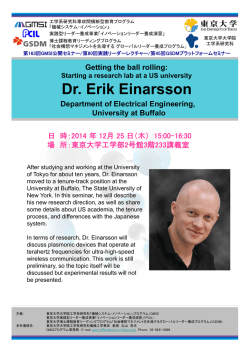
Cullen R. Buie, Ph.D.
工学系研究科専攻間横断型教育プログラム 「機械システム・イノベーション」 実践型リーダー養成事業「イノベーションリーダー養成演習」 博士課程教育リーディングプログラム 「社会構想マネジメントを先導する グローバルリーダー養成プログラム」 東京大学大学院 工学系研究科 第164回GMSI公開セミナー/第81回実践リーダーレクチャー/第46回GSDMプラットフォームセミナー EXPLOITING MICROSCALE TRANSPORT PHENOMENA IN ENERGY AND MICROBIOLOGY Cullen R. Buie, Ph.D. Department of Mechanical Engineering, Massachusetts Institute of Technology 日 時:2015年 1月 8 日(木) 15:30-16:40 場 所:東京大学工学部2号館3階232講義室 In this talk we will discuss efforts to non-invasively discriminate microorganisms based on phenotypes ranging from electrochemical activity to pathogenicity. We have recently designed a novel platform for screening cells known as three dimensional insulator based dielectrophoresis (3DiDEP). In dielectrophoresis (DEP), microorganisms in a non-uniform electric field experience forces related to their volume and dielectric properties. Differences in physical properties can be exploited to separate populations of cells. To date DEP has been used to sort cells based on morphology (e.g. gram positive vs. gram negative bacteria), size, and viability. 3DiDEP features advantages over previous embodiments of DEP in that it offers high sensitivity, uses low applied voltages, requires minimal fabrication, and is relatively simple. Our recent work has shown that 3DiDEP can be useful to distinguish bacteria with sub-species resolution. We will discuss our 3DiDEP design and describe exciting theoretical and experimental results on the characterization of pathogenic bacteria. Next, we will describe the development of a membrane-less, high power density hydrogen bromine flow battery that relies upon microscale flow phenomena. The membrane-less design enables power densities exceeding 0.9 W/cm2 at room temperature and atmospheric pressure, with a round-trip voltage efficiency of 92% at 25% of peak power. Our analytical and numerical models of the system incorporating reaction kinetics and species transport closely agree with experimental results. The Hydrogen Bromine Laminar Flow Battery combines favorable hydrogen/bromine reaction kinetics with the laminar flow architecture to achieve performance inaccessible to either technology independently. High power density, along with the potential for rechargeable operation, will translate into smaller, inexpensive systems that could revolutionize the fields of large-scale energy storage and portable power systems. 主催: 本件連絡先: 東京大学大学院工学系研究科「機械システム・イノベーション」プログラム(GMSI) 東京大学実践型リーダー養成事業「イノベーションリーダー養成演習」(PCIL) 東京大学博士課程教育リーディングプログラム「社会構想マネジメントを先導するグローバルリーダー養成プログラム」(GSDM) 東京大学大学院工学系研究科機械工学専攻 准教授 塩見 淳一郎 GMSIプログラム事務局 E-mail: [email protected] Phone: 03-5841-0696
© Copyright 2026

